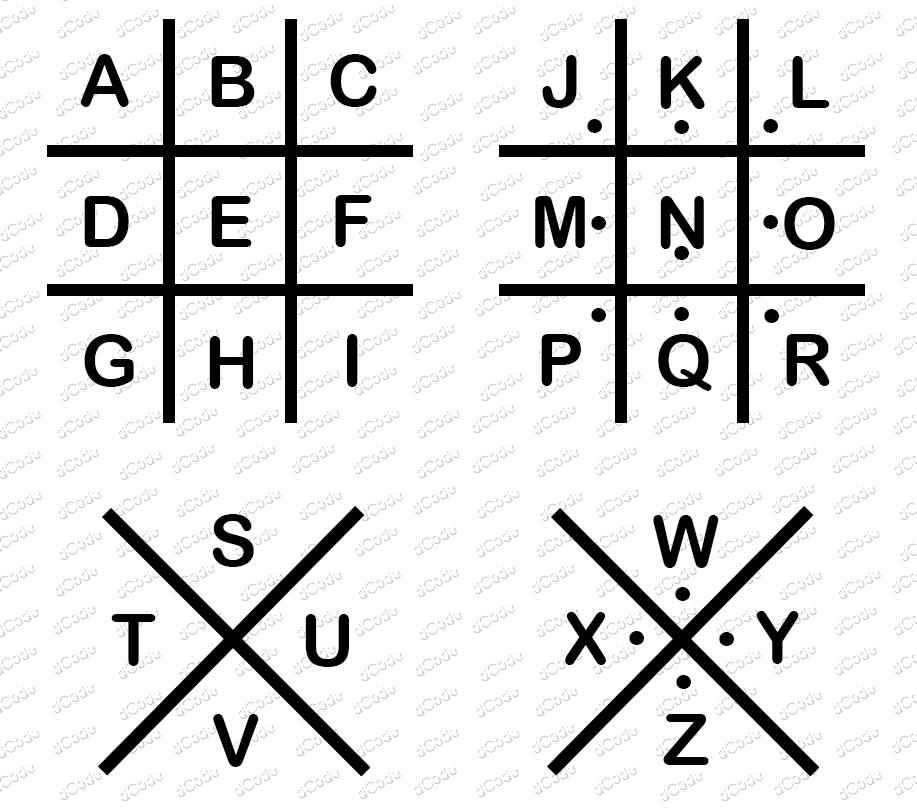Tool to decrypt/encrypt using masonic cipher. Freemasons' Pig Pen cipher (Pigpen) explained with the substitution alphabet with symbols composed of dashes and dots.
Pigpen Cipher - dCode
Tag(s) : Symbol Substitution
dCode is free and its tools are a valuable help in games, maths, geocaching, puzzles and problems to solve every day!
A suggestion ? a feedback ? a bug ? an idea ? Write to dCode!
Pigpen Cipher
PigPen Decoder
PigPen Encoder
Answers to Questions (FAQ)
What is the PigPen cipher? (Definition)
The Pig Pen Cipher, also known as the Freemason Cipher (or masonic alphabet), is an encryption system that was historically used by some members of Freemasonry to protect their communications.
It is based on a special arrangement of letters in a grid (cross or grid like tic tac toe) in order to use 26 symbols to represent the letters of the alphabet by substitution.
How to encrypt using PigPen cipher?
To encode a message with the Pig Pen number, each letter of the masonic alphabet is associated with a unique symbol.
The symbols are designed with a 3x3 grid/grid, crosses and dots as a basis.
The Pigpen correspondence/lookup table is therefore:
| A | .png) | B | .png) | C | .png) | D | .png) | E | .png) | F | .png) | G | .png) |
|---|---|---|---|---|---|---|---|---|---|---|---|---|---|
| H | .png) | I | .png) | J | .png) | K | .png) | L | .png) | M | .png) | N | .png) |
| O | .png) | P | .png) | Q | .png) | R | .png) | S | .png) | T | .png) | U | .png) |
| V | .png) | W | .png) | X | .png) | Y | .png) | Z | .png) | ||||
| dCode.fr | |||||||||||||
Numbers have no associated symbols.
Multiple variants exist for the creation of the masonic alphabet and each changes the association of symbols and letters (see below).
How to decrypt using PigPen cipher?
How to recognize PigPen ciphertext?
The ciphered message is made from symbols with right angles (corners) which sometime has a dot (1 symbol out of 2 has a dot).
The message has a maximum of 26 distinct characters.
The presence of notions such as pigs, pens, gate or farm are clues.
The reference to Charles M. Schulz's comic book Peanuts reminds us that one of his characters is called Pigpen.
The generalization of the Freemasons to the Illuminati is a common drift.
The eye of providence (all seeing eye) is a symbol of the Freemasons.
What are the variants of the Freemason's PigPen cipher?
It exists multiple variants for associating symbols and letters, here are those identified by dCode:
| #0 | ABCDEFGHIJKLMNOPQRSTUVWXYZ (Original version, filling grids ⌗,⌗• then crosses ✕,✕•) |
| #1 | ABCDEFGHIJKLMNOPQRSTVUWXZY (Variant modifying cross filling by rotation ⟲) |
| #2 | ABCDEFGHINOPQRSTUVJKLMWXYZ (⌗ then ✕ then ⌗• then ✕•) |
| #3 | NOPQRSTUVWXYZABCDEFGHIJKLM (⌗•, ✕• ⌗, ✕) |
| #4 | IJKLMNOPQRSTUVWXYZABCDEFGH (✕, ✕•, ⌗, ⌗•) |
| #5 | ACEGIKMOQBDFHJLNPRSUWYTVXZ (Variant alternating ⌗ and ⌗• then ✕ and ✕•) |
| #6 | ACEGIKMOQBDFHJLNPRSUYWTVZX (Variant of variant #5, filling crosses by rotation ✕⟲) |
| #7 | ABCDEFGHILMNOPRSTV-------- (Version Heinrich Cornelius Agrippa von Nettelsheim) |
| #8 | BDFHJLNPRACEGIKMOQT-V-S-U- (Version La Buse) |
The Knight Templars cipher, the rosicrucian cipher, tic tac toe cipher, or the Dada Urka cipher are very similar and have very close symbols.
Any other variant remains decipherable by mono-alphabetic substitution.
Why was Pig Pen cipher created?
Used by the Freemasons, this encryption allowed a secret and relatively secure written correspondence.
Why this cipher is named Pig Pen?
Symbols can be assimilated to pens and dots could be interpreted as small pigs.
When PigPen was invented?
The Pig Pen Cipher is of ancient origin, but its exact date of invention is not known with certainty.
It has been widely used by Freemasons throughout their history, but its precise origins remain a subject of debate among historians.
Source code
dCode retains ownership of the "Pigpen Cipher" source code. Any algorithm for the "Pigpen Cipher" algorithm, applet or snippet or script (converter, solver, encryption / decryption, encoding / decoding, ciphering / deciphering, breaker, translator), or any "Pigpen Cipher" functions (calculate, convert, solve, decrypt / encrypt, decipher / cipher, decode / encode, translate) written in any informatic language (Python, Java, PHP, C#, Javascript, Matlab, etc.) or any database download or API access for "Pigpen Cipher" or any other element are not public (except explicit open source licence like Creative Commons). Same with the download for offline use on PC, mobile, tablet, iPhone or Android app.
Reminder: dCode is an educational and teaching resource, accessible online for free and for everyone.
Cite dCode
The content of the page "Pigpen Cipher" and its results may be freely copied and reused, including for commercial purposes, provided that dCode.fr is cited as the source.
Exporting the results is free and can be done simply by clicking on the export icons ⤓ (.csv or .txt format) or ⧉ (copy and paste).
To cite dCode.fr on another website, use the link:
In a scientific article or book, the recommended bibliographic citation is: Pigpen Cipher on dCode.fr [online website], retrieved on 2025-04-13,
- PigPen Decoder
- PigPen Encoder
- What is the PigPen cipher? (Definition)
- How to encrypt using PigPen cipher?
- How to decrypt using PigPen cipher?
- How to recognize PigPen ciphertext?
- What are the variants of the Freemason's PigPen cipher?
- Why was Pig Pen cipher created?
- Why this cipher is named Pig Pen?
- When PigPen was invented?

